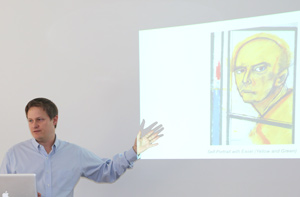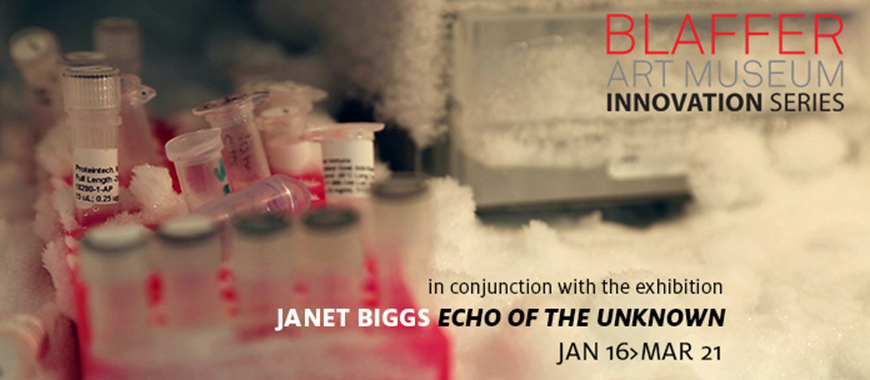Research News
Science Meets Art
Eriksen's Lab Featured in Blaffer Museum Exhibition Exploring Science, Human Dimension of Alzheimer's Disease
UH College of Pharmacy faculty researcher Jason Eriksen's lab was part of a UH Blaffer Art Museum multimedia exhibition about Alzheimer's disease and a complementary lecture series aimed at exploring the roots of identity while serving as a bridge between art and science. The exhibition, "Janet Biggs: Echo of the Unknown," runs through March 21 and the lectures, part of Blaffer's Innovation Series, conclude on March 10.
"Echo of the Unknown" is described as a multidimensional exhibition combining video, sound, and objects that explore the role of memory in the construction of identity. Drawing from her personal memories of the effects of Alzheimer’s on family members, heroic stories of public figures coping with the disease, and research conducted with neurologists and geoscientists, Biggs raises fundamental questions about how we become–and how we lose our sense of "who we are."
In the segments delving into the Alzheimer's research at UH, Biggs documented – in audio/video and still photographs – work being done within Eriksen's lab and in UH Biology & Biochemistry Imaging Core to study the pathology of the disease.

In conjunction with the exhibition, Blaffer also collaborated with more than a dozen UH colleges and Houston institutions on the Blaffer Art Museum Innovation Series, an ambitious slate of lectures, gallery talks and panel discussions, enhancing the exhibition’s role as a catalyst for cross-disciplinary learning.
Following the opening night of the exhibition with Biggs, Eriksen kicked off the series with a lecture entitled "Fit Body, Fit Mind: The Surprising Science of Exercise and Alzheimer's Disease." In his lecture, Eriksen discussed the work of Dr. Alois Alzheimer, who first identified the disease, and artist/Alzheimer's patient William Utermohlen, whose self-portraits over a five-year period following his diagnosis illustrated the disease's impact on his skills and psychological/emotional state.
"It seemed like a unique opportunity to reach out to the students, the UH community and those who may have some personal experience with Alzheimer's to look at this disease from multiple angles and perspectives, including the those of us working to better understand it and potential avenues for slowing, delaying or even reversing its onset or progression," Eriksen said.
